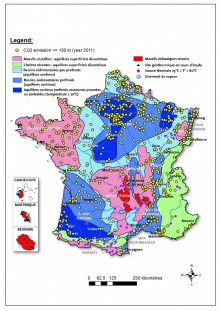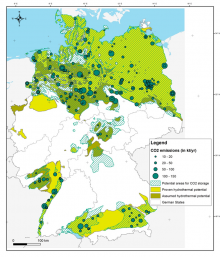Map of potential applicability in France
>Inventory of compatible emitters
Maps have been drawn up to match the locations of low-emission industrial facilities (yellow dots for France, green dots for Germany) with geothermal resources in aquifers of deep sedimantary basins.
France
Compatible emitters (2011 data) :
•653 small emitters, emitting 25 Mt of CO2/year, equivalent to 17% of French industrial emissions
•More than 350 compatible emitters identified in the Paris basin and in the Aquitaine basin
Elsewhere
•The concept has a real potential of deployment in the other countries considered, Germany and the USA
•In Germany, 242 small emitters are identified accounting for 10 Mt of CO2/year, mainly located in the North German Basin
Map of potential applicability in Germany
>Water-rock interactions demonstrated and quantified
The reactivity expected between the rock and the acidified and/or cooled brine has been characterized and quantified through laboratory experiments, on-site measurements and numerical simulations. The results are highly consistent
>Assessment of the storage performance and lifetime
Simulations have shown that the amount of CO2 that can be stored tends to decrease over time, due to migration of injected dissolved CO2 towards the production well. Nonetheless, in all cases the lifetime of a storage site is at least equal to that of a geothermal doublet, typically around 30 years
For the well casing material, epoxy resin (ERG) is preferred to steel to avoid corrosion problems, accentuated by acidification of the injected water
>Preliminary economic assessment study
The CO2-DISSOLVED concept was shown to be economically more viable than the standard CCS approach (supercritical CO2, single injection well) when applied to a test case of a bioethanol production plant located near Oléans, France
2/3 of the CO2-DISSOLVED scenarios simulated are economically profitable with a CO2 price above 20 €/ton.
Dernière mise à jour le 18.12.2017











